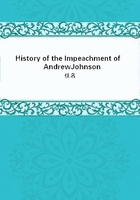
第93章 THE CONSTITUTIONAL POWER OF IMPEACHMENT.(5)
Sir:--I am in receipt of your letter of the 5th of February, calling my attention to the correspondence published in the Chronicle between the President and General Grant, and especially to that part of it which refers to the conversation between the President and General Grant at the Cabinet meeting on Tuesday, the 14th of January, with a request that I state what was said in that conversation. In reply, I have the honor to state that Ihave read carefully the correspondence in question, and particularly the letter of the President to General Grant, dated January 31, 1868. The following extract from your letter of the 31st January to General Grant is, according to my recollection, a correct statement of the conversation that took place between the President and General Grant at the Cabinet meeting on the 14th of January last. In the presence of the Cabinet the President asked General Grant whether, "in conversation which took place after his appointment as Secretary of War ad interim, he did not agree either to remain at the head of the War Department and abide any judicial proceedings that might follow the non-concurrence by the Senate in Mr. Stanton's suspension, or, should he wish not to become involved in such a controversy, to put the President in the same position with respect to the office as he occupied previous to General Grant's appointment by returning it to the President in time to anticipate such action by the Senate." This General Grant admitted.
The President then asked General Grant if, at the conference on the preceding Saturday, he had not, to avoid misunderstanding, requested General Grant to state what he intended to do; and further, if in reply to that inquiry he (General Grant) had not referred to their former conversations, saying that from them the President understood his position, and that his (General Grant's) action would be consistent with the understanding which had been reached. To these questions General Grant replied in the affirmative.
The President asked General Grant if, at the conclusion of their interview on Saturday, it was not understood that they were to have another conference on Monday, before final action by the Senate in the case of Mr. Stanton.
General Grant replied that such was the understanding, but that he did not suppose the Senate would act so soon; that on Monday he had been engaged in a conference with General Sherman, and was occupied with "many little matters," and asked if General Sherman had not called on that day.
I take this mode of complying with the request contained in the President dent's letter to me, because my attention had been called to the subject before, when the conversation between the President and General Grant was under consideration.
Very respectfully, your obedient servant, Alexander W. Randall, Postmaster General.
To the President.
Department of the Interior, Washington, D. C., February 6, 1868.
Sir:--I am in receipt of yours of yesterday, calling my attention to a correspondence between yourself and General Grant, published in the Chronicle newspaper, and especially to that part of said correspondence "which refers to the conversation between the President and General Grant at the Cabinet meeting on Tuesday, the 14th of January," and requesting me "to state what was said in that conversation."In reply, I submit the following statement: At the Cabinet meeting on Tuesday, the 14th of January, 1868, General Grant appeared and took his accustomed seat at the board. When he had been reached in the order of business the President asked him, as usual, if he had anything to present?
In reply, the General, after referring to a note which he had that morning addressed to the President, inclosing a copy of the resolution of the Senate refusing to concur in the reasons for the suspension of Mr. Stanton, proceeded to say that he regarded his duties as Secretary of War ad interim terminated by that resolution, and that he could not lawfully exercise such duties for a moment after the adoption of the resolution by the Senate.
That the resolution reached him last night, and that this morning he had gone to the War Department, entered the Secretary's room, bolted one door on the inside, locked the other on the outside, delivered the key to the Adjutant General, and proceeded to the headquarters of the Army, and addressed the note above mentioned to the President, informing him that he (General Grant) was no longer Secretary of War ad interim.
The President expressed great surprise at the course which General Grant had thought proper to pursue, and, addressing himself to the General, proceeded to say, in substance, that he had anticipated such action on the part of the Senate, and being very desirous to have the constitutionality of the Tenure-of-Office bill tested, and his right to suspend or remove a member of the Cabinet decided by the judicial tribunals of the country, he had some time ago, and shortly after General Grant's appointment as Secretary of War ad interim, asked the General what his action would be in the event that the Senate should refuse to concur in the suspension of Mr. Stanton, and that the General had agreed either to remain at the head of the War Department till a decision could be obtained from the court or resign the office in the hands of the President before the case was acted upon by the Senate, so as to place the President in the same situation he occupied at the time of his (Grant's)appointment.
The President further said that the conversation was renewed on the preceding Sunday, at which time he asked the General what he intended to do if the Senate should undertake to reinstate Mr.